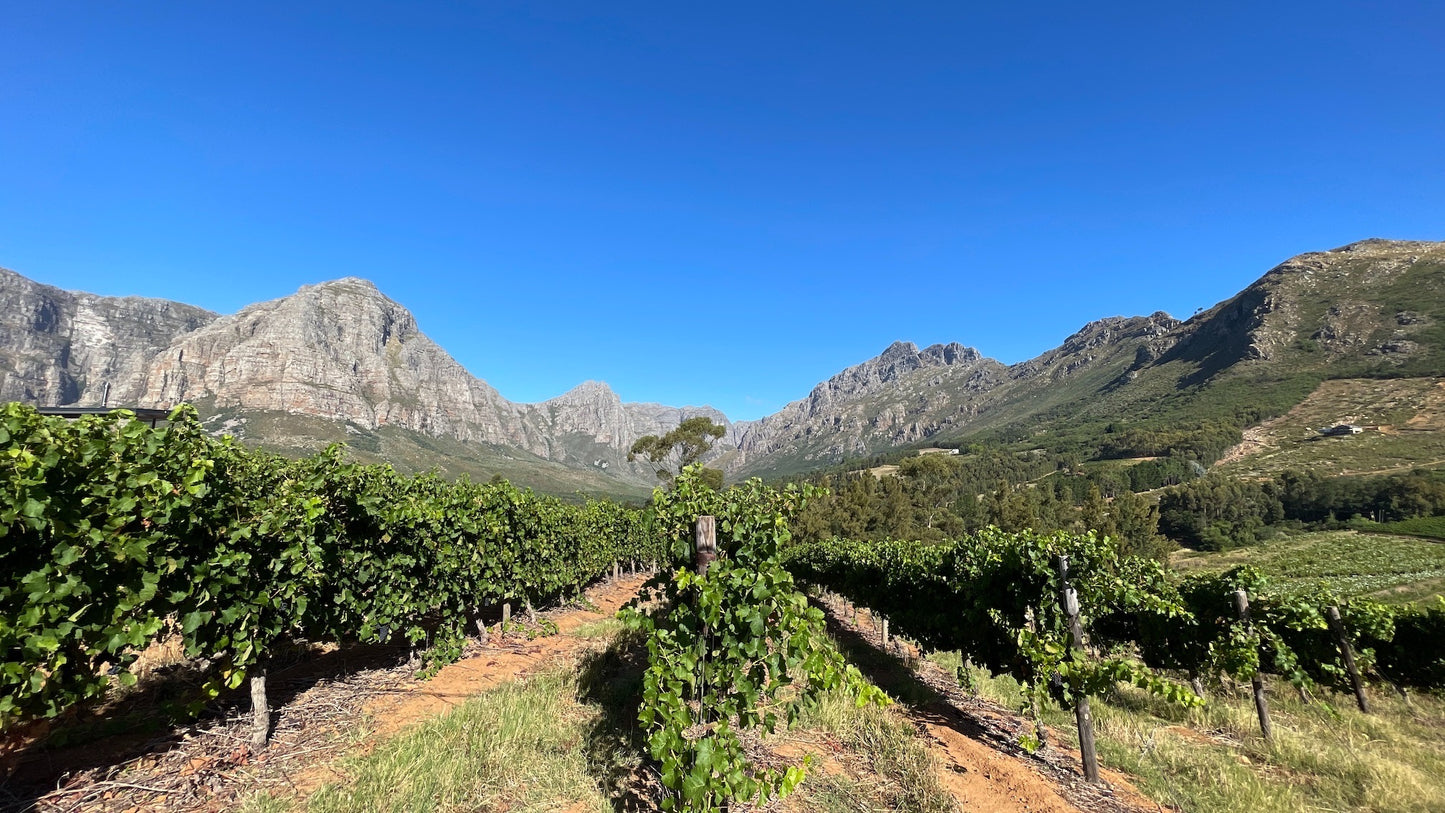
Ask any wine enthusiast about South African wines and they'll tell you that they are indeed some of the most exciting and distinct wines in the world. But why is that so? What makes South African wines so distinct and exciting? In this blog post, we'll take a look at the terroir and history of South African wines, and explore what makes them so unique.
Terroir: South Africa is home to some of the most amazing soil, terroir, location, and oceans. In fact, the diversity in terroir is what makes South Africa a wine lover's paradise. The Cape winelands are characterized by a Mediterranean climate with cold, wet winters and warm, dry summers. This unique climate provides the perfect environment for wine grapes to grow, resulting in diverse and complex flavors. The soil diversity is equally impressive, ranging from granite to sandstone, clay to shale, and everything in-between.
At Message In A Bottle (MIAB), we've sourced some spectacular wines from the cooler region of Hemel-en-Aarde (translated into "Heaven and Earth" in English) - a region which is most often compared to the Burgundy region of France, as opposed to the warmer historical wine region of Stellenbosch.
History: The history of South African wines is intertwined with its political history. Wine production in the region dates back to 1659 when the first vineyard was planted in Constantia. However, it was only in the 1990s, after Nelson Mandela was released, that things started to change. With the advent of democracy in 1994, the wine industry was liberated, and wine exports started to take off. Wine marketers and markets were exposed to international trends and know-how, and farmers began replanting. As a result, the South African wine industry has experienced a renaissance of sorts and is now a serious contender in the global wine market.
No Stereotypes: One of the most exciting things about South African wines is that there are no stereotypes. Each wine is full of life – distinctive and exciting. This is largely due to the diversity in terroir and the winemakers' commitment to experimentation. South African wines are made in a wide range of styles, from traditional European-style wines to bold and fruity New World-style wines. This means that there is a South African wine for every palate.
Varietals: South Africa is famous for its Chenin Blanc, which can range in style from crisp and dry to sweet and honeyed. Other popular varietals include Syrah/Shiraz, Sauvignon Blanc, Cabernet Sauvignon, Pinot Noir, and Merlot. South African winemakers also experiment with lesser-known varietals, such as Pinotage, a grape varietal unique to South Africa that is a cross between Pinot Noir and Cinsault.
Cabernet Franc, while less known than its offspring Cabernet Sauvignon, has found a remarkable niche in South Africa's diverse terroir. It excels particularly in cooler climate regions, where it develops rich, complex flavors while maintaining a refreshing acidity. South African Cabernet Franc typically exhibits notes of ripe red berries, bell pepper, and distinct herbaceous characteristics. Complemented by the subtle influence of French oak, it often reveals hints of dark chocolate and spice in the finish. These wines are known for their elegance and balance, standing out in the global wine stage for their unique expression of the varietal.
Good trade practises: South Africa has been proactive in establishing various bodies to ensure ethical practices in its wine industry, focusing on fair trade and sustainable farming. The Integrated Production of Wine (IPW) scheme, established in 1998, promotes environmentally sustainable wine production. It covers a broad range of viticulture and winemaking practices and is closely aligned with the global Wine and Spirit Board's sustainability initiative. The Fairtrade Label South Africa (FLSA) ensures that producers receive fair prices and promotes social sustainability among South African wine farming communities. The Biodiversity & Wine Initiative (BWI) is another significant body that encourages wine producers to conserve their natural heritage. These bodies work collectively towards a sustainable and fair future for the South African wine industry.
Compressed innovation: In recent decades, the South African wine industry has witnessed a surge of innovation, driven by a combination of technology and a new generation of winemakers. Technological advancements, such as precision viticulture and sustainable winemaking techniques, have allowed for improved vineyard management and wine quality. Modern winemakers are also experimenting with less conventional grape varieties and fermentation methods, producing exciting and unique wines. Furthermore, South Africa's wine tourism has blossomed, with wineries offering sophisticated tasting rooms, gourmet restaurants, and luxurious accommodations. These initiatives have not only elevated the global standing of South African wines but also ensured the industry's sustainable growth.
Tasting Experience: Tasting South African wines is truly a unique experience. With such a diverse terroir, there is an endless variety of wines to taste, each with its unique character and personality. Whether you prefer full-bodied and complex reds or crisp and refreshing whites, South Africa has something for everyone. The best way to explore South African wines is to take a trip to the winelands and experience the region's beauty and charm firsthand.
In conclusion, South African wines are a unique and exciting addition to the global wine market. With its diverse terroir, history, and commitment to experimentation, South Africa has firmly established itself as a wine-producing country to watch. Whether you're a wine enthusiast or just someone who enjoys a good glass of wine, we highly recommend exploring South African wines. We guarantee that you won't be disappointed!
Give our wines a try. For the month of August, enjoy 15% off storewide. Explore the wines now.
